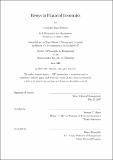| dc.contributor.advisor | Stewart C. Myers. | en_US |
| dc.contributor.author | Edmans, Alex | en_US |
| dc.contributor.other | Sloan School of Management. | en_US |
| dc.date.accessioned | 2008-03-26T21:08:20Z | |
| dc.date.available | 2008-03-26T21:08:20Z | |
| dc.date.copyright | 2007 | en_US |
| dc.date.issued | 2007 | en_US |
| dc.identifier.uri | http://hdl.handle.net/1721.1/40855 | |
| dc.description | Thesis (Ph. D.)--Massachusetts Institute of Technology, Sloan School of Management, 2007. | en_US |
| dc.description | This electronic version was submitted by the student author. The certified thesis is available in the Institute Archives and Special Collections. | en_US |
| dc.description | Includes bibliographical references. | en_US |
| dc.description.abstract | This thesis consists of three essays in financial economics. Chapter 1 is entitled "Inside Debt." Existing theories advocate the use of cash and equity in executive compensation. However, recent empirical studies have documented the prevalence of debt-like instruments such as pensions. This chapter rationalizes the use of such inside debt as an effcient solution to the agency costs of debt. Owing to its greater sensitivity to liquidation payoffs, inside debt is more effective at optimizing project selection than the bonuses, private benefits and reputational concerns advocated by prior literature. Contrary to intuition, it is typically inefficient to align the manager with firm value by granting him equal proportions of debt and equity. Chapter 2 is entitled "Sports Sentiment and Stock Returns" and co-authored with Diego Garcia and Oyvind Norli. We investigate the stock market reaction to sudden changes in investor mood. Motivated by psychological evidence of a strong link between soccer outcomes and mood, we use international soccer results as our primary mood variable. We find a significant market decline after soccer losses. For example, a loss in the world Cup elimination stage leads to a next-day abnormal stock return of -49 basis points. This loss effect is stronger in small stocks and in more important games, and is robust to methodological changes. We also document a loss effect after international cricket, rugby, and basketball games. | en_US |
| dc.description.abstract | (cont.) Chapter 3 is entitled "Leverage, Ownership Concentration, and the Tension Between Liquidation and Investment." Allowing early liquidation minimizes investor losses if the manager is unskilled. However, the possibility of liquidation deters a skilled manager from undertaking long-term projects that risk interim turbulence. This chapter introduces a novel role of debt that overcomes this tension. Leverage concentrates equity holders' stakes, creating incentives for them to find out whether short-term losses result from low ability or a temporary down-turn in a profitable project. If the firm is fundamentally sound, it is not liquidated upon poor performance. Debt therefore allows termination without inducing myopia. Unlike models of managerial discipline based on total payout, here dividends are not a substitute for debt as they achieve liquidation without incentivizing monitoring. | en_US |
| dc.description.statementofresponsibility | by Alexander James Edmans. | en_US |
| dc.format.extent | 98 p. | en_US |
| dc.language.iso | eng | en_US |
| dc.publisher | Massachusetts Institute of Technology | en_US |
| dc.rights | M.I.T. theses are protected by
copyright. They may be viewed from this source for any purpose, but
reproduction or distribution in any format is prohibited without written
permission. See provided URL for inquiries about permission. | en_US |
| dc.rights.uri | http://dspace.mit.edu/handle/1721.1/7582 | en_US |
| dc.subject | Sloan School of Management. | en_US |
| dc.title | Essays in financial economics | en_US |
| dc.type | Thesis | en_US |
| dc.description.degree | Ph.D. | en_US |
| dc.contributor.department | Sloan School of Management | |
| dc.identifier.oclc | 196640243 | en_US |
